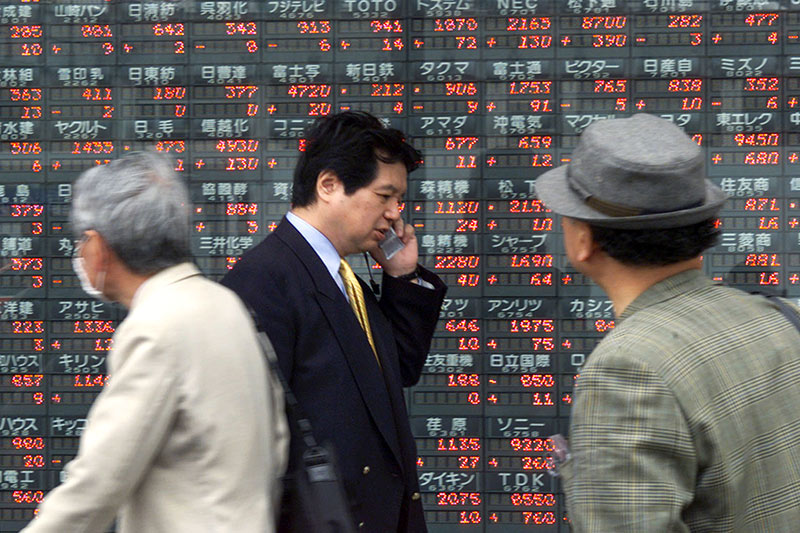Investing.com - Asian stock markets were higher during late Asian trade on Tuesday, with shares in Japan rallying to the highest level since August 2008, as the U.S. dollar hovered just below the key psychological JPY100-level.
Data showing that inflation in China slowed more-than-expected last month and a solid start to the U.S. earning season further supported sentiment.
During late Asian trade, Hong Kong's Hang Seng Index was up 1%, Australia’s ASX/200 Index ended up 1.4%, while Japan’s Nikkei 225 Index closed little changed after hitting a fresh five-year high earlier in the session.
Official data released earlier showed that consumer prices in China rose 2.1% in March from a year earlier, below expectations for a 2.5% increase and slowing sharply from a 3.2% rate of increase in February.
The slower-than-expected increase in the rate of inflation could prompt policy makers in Beijing to introduce fresh easing measures to boost economic growth in the world’s second largest economy.
In Hong Kong, the Hang Seng was higher for the first time in four days, as investors set aside concerns over the impact of a bird flu outbreak in China.
Insurance companies recovered from recent losses, with Ping An Insurance Group jumping 3.5%, while China Life Insurance Group surged 6.6%.
Chinese financials were also higher, with China Construction Bank shares rising 1%, Industrial and Commercial Bank of China adding 1.2% and Bank of China advancing 2%.
Shares in China’s largest aluminum producer Aluminum Corporation of China, or CHALCO, climbed 3.2% after U.S. counterpart Alcoa posted better-than-expected first quarter earnings after Monday’s closing bell in New York.
Elsewhere, in Australia, the benchmark ASX/200 Index rose sharply as miners performed strongly.
Mining heavyweights Rio Tinto and BHP Billiton added 3.5% and 1.5% respectively, while Alumina rallied 5%, following upbeat earnings from U.S. aluminum giant Alcoa.
The big four banks were all higher, with Australia's number 1 lender, the Commonwealth Bank of Australia rising 1.3%, while National Australia Bank and Westpac Banking Group climbed 3.5% and 2.6% respectively.
Meanwhile, in Tokyo, the Nikkei rose sharply earlier in the session to hit a fresh 56-month high as the U.S. dollar edged closer to the key 100-yen level, boosting the earnings outlook for many big name Japanese exporters.
A weaker yen increases the value of overseas income at Japanese companies when repatriated, boosting the outlook for export earnings.
The BoJ conducted its first government bond purchasing operation on Monday, purchasing JPY1.2 trillion of Japanese government bonds maturing in five years or more.
Looking ahead, European stock market futures pointed to a steady open. The EURO STOXX 50 futures pointed to a gain of 0.1% at the open, France’s CAC 40 futures were flat, London’s FTSE 100 futures were little chnaged, while Germany's DAX futures pointed to a gain of 0.1% at the open.
Earlier in the day, government data showed that Germany’s trade surplus widened to EUR17.1 billion from 15.6 billion in January, above expectations for a surplus of EUR15.0 billion.
The report said exports fell 1.5% in February, while imports fell by 3.8%.
Data showing that inflation in China slowed more-than-expected last month and a solid start to the U.S. earning season further supported sentiment.
During late Asian trade, Hong Kong's Hang Seng Index was up 1%, Australia’s ASX/200 Index ended up 1.4%, while Japan’s Nikkei 225 Index closed little changed after hitting a fresh five-year high earlier in the session.
Official data released earlier showed that consumer prices in China rose 2.1% in March from a year earlier, below expectations for a 2.5% increase and slowing sharply from a 3.2% rate of increase in February.
The slower-than-expected increase in the rate of inflation could prompt policy makers in Beijing to introduce fresh easing measures to boost economic growth in the world’s second largest economy.
In Hong Kong, the Hang Seng was higher for the first time in four days, as investors set aside concerns over the impact of a bird flu outbreak in China.
Insurance companies recovered from recent losses, with Ping An Insurance Group jumping 3.5%, while China Life Insurance Group surged 6.6%.
Chinese financials were also higher, with China Construction Bank shares rising 1%, Industrial and Commercial Bank of China adding 1.2% and Bank of China advancing 2%.
Shares in China’s largest aluminum producer Aluminum Corporation of China, or CHALCO, climbed 3.2% after U.S. counterpart Alcoa posted better-than-expected first quarter earnings after Monday’s closing bell in New York.
Elsewhere, in Australia, the benchmark ASX/200 Index rose sharply as miners performed strongly.
Mining heavyweights Rio Tinto and BHP Billiton added 3.5% and 1.5% respectively, while Alumina rallied 5%, following upbeat earnings from U.S. aluminum giant Alcoa.
The big four banks were all higher, with Australia's number 1 lender, the Commonwealth Bank of Australia rising 1.3%, while National Australia Bank and Westpac Banking Group climbed 3.5% and 2.6% respectively.
Meanwhile, in Tokyo, the Nikkei rose sharply earlier in the session to hit a fresh 56-month high as the U.S. dollar edged closer to the key 100-yen level, boosting the earnings outlook for many big name Japanese exporters.
A weaker yen increases the value of overseas income at Japanese companies when repatriated, boosting the outlook for export earnings.
The BoJ conducted its first government bond purchasing operation on Monday, purchasing JPY1.2 trillion of Japanese government bonds maturing in five years or more.
Looking ahead, European stock market futures pointed to a steady open. The EURO STOXX 50 futures pointed to a gain of 0.1% at the open, France’s CAC 40 futures were flat, London’s FTSE 100 futures were little chnaged, while Germany's DAX futures pointed to a gain of 0.1% at the open.
Earlier in the day, government data showed that Germany’s trade surplus widened to EUR17.1 billion from 15.6 billion in January, above expectations for a surplus of EUR15.0 billion.
The report said exports fell 1.5% in February, while imports fell by 3.8%.
